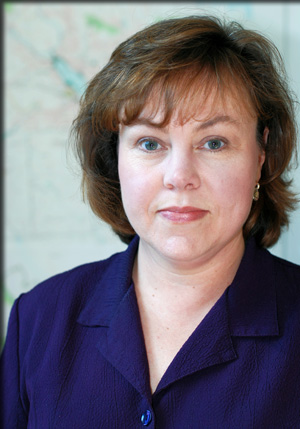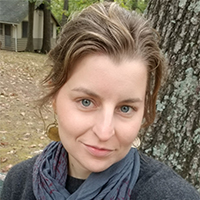Faculty Profile
Margaret Bryant


Associate Professor & Chair Landscape Architecture
Department of Landscape Architecture
101 Marshall Hall
Education
- Ph.D. in Regional Planning, University of Massachusetts Amherst
- Master of Landscape Architecture, University of Georgia
- Bachelor of Science, Horticulture, Mississippi State University
Area of Specialization
I have a passion for land. In more specific terms, I am passionate about land and water resources and about helping people make better decisions about their use. I act on this passion in two ways: (1) conducting research and outreach in land use/landscape planning and (2) teaching future planners and designers about ecological systems and the associated complexities inherent in decisions about use and management.
Both rural and urban land use questions interest me, but I find that much of my work centers on urban ecological systems and the land management decisions of local governments. Land use conflicts create demand for innovative planning and design, and cities are contested spaces whose importance is only increasing as urbanization rapidly expands around the globe. I have conducted research in the areas of urban biodiversity; remnant urban green space and its use for improving water quality and for providing neighborhood amenities (as greenways and as a way of promoting active living, especially in low socio-economic status neighborhoods); and ecologically sensitive, conservation-oriented, land planning and management.
Motivation for my work as a landscape architecture educator comes from the concepts articulated as “the site speaks first” and “site as source,” a respect for the land itself, hydrological systems, and the complexities of socio-ecological systems. Reading the landscape is a fundamental skill of the profession, and I enjoy the process of helping students see the landscape in ways that they haven’t before, in ways that lead to informed, responsible, and poetic design responses. Like the botanist who can travel the world and recognize genera or families of plants even if a particular species is new to them, the landscape architect can use their skills to analyze and understand biophysical systems wherever they encounter them. In studio classes, we practice these skills, using them to discover patterns in large landscapes and then relating the patterns to opportunities for planning and design interventions at the site scale. My portfolio includes many collaborations planning agencies and environmental organizations that need such analyses as part of their comprehensive planning processes. Real world needs are brought into classes so that students and practitioners both benefit.
My research interests center on how people process landscape data, with a focus on how data is used to make decisions about public and private investments in our communities. These decisions are predicated on data analysis and synthesis, and they often originate in ideas presented in professional plans and designs. Plan making as an expression of the social construction of knowledge is an interest I have pursued over the length of my career, primarily as a person involved in the creation of plans. My work bridges landscape architecture and urban and regional planning, an area of expertise sometimes identified as landscape planning.
Teaching Experience
- SUNY College of Environmental Science & Forestry (2007-Present)
- Virginia Polytechnic Institute and State University (8 years)
Practice Experience
- Jordan, Jones & Goulding, Inc – Environmental/Land Use Planning
- Pioneer Valley Planning Commission - Environmental/Land Use Planning
- METLAND Landscape Planning Group – Planning Research and Outreach
- Institute for Community and Area Development – Planning Research and Outreach
Courses Taught
- LSA 326 Landscape Design Studio I
- LSA 321 Ecological Applications in Planning and Design
- LSA 470/670 – Thematic Landscape Design Studio
- LSA 496/696 – Community Mapping and GIS
- Seminars: Community Development Process, Shaping Cities
Teaching and Research Interests
- Ecologically-based physical planning and design
- Landscape/land use planning, including conservation land planning
- Environmental determinants of health
- Neighborhood-scale planning
Professional Reports
Bryant, M.M. and Carolyn Copenhaver. 2021. A Fresh Look at the Salmon River Corridor: Oswego County, New York. Report submitted to NYS Department of Environmental Conservation. 94 pages.
Bryant, M.M. 2019. Public Engagement in a Time of Change: A Scoping Study for the Central Pine Barrens. Report submitted to Central Pine Barrens Joint Planning & Policy Commission. 49 pages.
Bryant, M.M. 2016. Common Ground Jackson. Report submitted to Downtown Jackson Partners, Jackson, Mississippi. 200 pages.
Grohol, E. and M.M. Bryant. 2015. Chancellorsville at a Crossroads. Report submitted to the National Park Service Olmsted Center for Landscape Preservation and the Fredericksburg & Spotsylvania National Military Park, Fredericksburg, Virginia. 166 pages.
Bryant, M.M. and K. Van Der Geest. 2014. Think Like a Watershed: The Nine Mile Creek Watershed Planning Project. Report submitted to the Nine Mile Creek Conservation Council, Liverpool, New York. 140 pages.
Selected Publications
Bryant, M.M. 2019. From Thermodynamics to Creativity: McHarg’s Ecological Planning Theory and Its Implications For Resilience Planning and Adaptive Design. Socio-Ecological Practice Research. https://doi.org/10.1007/s42532-019-00027-1
Bryant, M.M. 2019. Boom and Decline: When Greenways Link Low and High SES Neighborhoods. Paper. Proceedings of the Fábos Conference on Landscape and Greenway Planning 6: 3. https://scholarworks.umass.edu/fabos/vol6/iss1/3/
Bryant, M.M. 2011. Climate Adaptation: A Research Agenda for Landscape Architects. Proceedings: CELA 2011 Urban Nature: 769 - 781. Council of Educators in Landscape Architecture (www.thecela.org).
Bryant, M.M. 2009. Urban Green Infrastructure, Public Health, and Local Government: Lessons Learned From Long-Term Engagement With One American City. Proceedings: CELA 2008-2009 Teaching + Learning Landscape: 175-178. Council of Educators in Landscape Architecture (www.thecela.org).
Bryant, M.M. 2006. Urban Landscape Conservation and the Role of Ecological Greenways at Local and Metropolitan Scales. Landscape and Urban Planning 76: 23-44. https://doi.org/10.1016/j.landurbplan.2004.09.029
Musacchio, L., E. Ordenerol, M.M. Bryant, and T. Evans. 2005. Changing Landscapes, Changing Disciplines: Seeking to Understand Interdisciplinarity in Landscape Ecological Change Research. Landscape and Urban Planning 73: 326-338. https://doi.org/10.1016/j.landurbplan.2004.08.003
Current Graduate Advisees
 Shaun Ahmad
Shaun Ahmad
shahmad@syr.edu
- Degree Sought: MLA
- Graduate Advisor(s): Bryant
- Area of Study: Landscape Architecture
 Amber Ballenger
Amber Ballenger
asballen@syr.edu
- Degree Sought: MS
- Graduate Advisor(s): Kayira and Bryant
- Area of Study: Environmental Science
 Madeline Bollinger
Madeline Bollinger
mbolling@syr.edu
- Degree Sought: MLA
- Graduate Advisor(s): Bryant
- Area of Study: Landscape Architecture
 Hannah Smith
Hannah Smith
hsmith51@syr.edu
- Degree Sought: MLA
- Graduate Advisor(s): Bryant
- Area of Study: Landscape Architecture
Hannah Brook Smith
Future Landscape Architect
Personal Statement
To co-create green spaces that promote positive public health outcomes that also serve the needs of climate resilient design solutions that we will ALL need now and into the future. Healthy places equals healthy people. We cannot have one without the other. There is no separation.
*Current* Graduate Research
Human-Nature Relationships + Civic Participation + Sustainable Waste Management Solutions + Public Health Outcomes
Favorite Quote
"You are in danger of living a life so comfortable and soft that you will die without ever realizing your true potential...I don't stop when I'm tired, I stop when I'm done." - David Goggins
 IZ Zayas
IZ Zayas
ezayas@syr.edu
- Degree Sought: MLA
- Graduate Advisor(s): Bryant
- Area of Study: Landscape Architecture